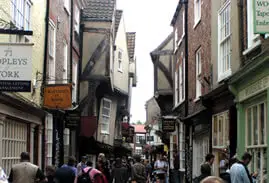A scene of disorder; a ruin; a mess.
A complete shambles
What's the meaning of the phrase 'A complete shambles'?
What's the origin of the phrase 'A complete shambles'?
Journalists today are hyperbolical – and I don’t mean they have taken to studying conic sections; but they do like to hype things up. Nothing is ever new, it is brand new and more often brand spanking new. Likewise, the nice little word ‘shambles’ is now almost always accompanied by one of the intensifiers ‘total’ or ‘complete’. That intensification began around the middle of the 19th century – for example, this piece from the English literary journal Bentley’s Miscellany, 1846:
I stepped onto her decks; they were a complete shambles, a dozen or more men lay about the after part of the ship.
Note the link between ‘shambles’ and blood and gore – more on that later.
Many newspaper stories in the UK in early 2010 have had occasion to refer to shambles. The accounts of the earthquakes in Haiti and Chile have described the cities of Port-au-Prince and Conception as ‘a total shambles’, ‘a complete shambles’ etc. It has also been reported that The Shambles area of York has been voted ‘Britain’s most picturesque street’. Even there, shambles wasn’t allowed out alone, as the Daily Mail’s report on Google’s Street View Awards, March 2010:
“Britain’s most picturesque street is a complete Shambles”
What’s going on here? The same newspapers are using ‘shambles’ to describe ‘the worst of cities’ and ‘the best of cities’. Oddly enough, for two apparent polar extremes, the ‘devastated’ shambles and the ‘pretty’ shambles derive from the same source. More oddly still, that source is a small wooden bench.
As early as AD825 there is a documentary record of the Old English word ‘scomul’ [later called shamble], meaning ‘footstool’. This derives from the Latin ‘scamellum’, meaning ‘small bench’. By AD971 ‘shamble’ had been recorded as meaning ‘bench for the sale of goods’ and by 1305 ‘stall for the sale of meat’. Here’s where York comes into it. The introduction to a 1410 copy of the text of the York Mystery Plays makes reference to a dispute between various crafts guilds in the town. Candlemakers were up in arms complaining that other guilds were muscling in on their territory and selling candles without a licence. The text is long and difficult to decipher, but the important point from our perspective is that it makes specific mention of York’s ‘Flesshchameles’, [‘flesh shambles’], that is, ‘stalls selling meat’. Other English towns also had ‘shambles’ meat markets, for example Nottingham, as is recounted in The Records of the Borough of Nottingham, 1484:
The twychell betwix ye Shaumelles and ye Draperie [The narrow lane between the meat market and the clothes shops].
Go to York today and you will find the narrow lanes of The Shambles to be bustling with tourists and shoppers. In the Middle Ages it must have been mayhem, the streets crammed full with stalls of all manner of trades – in addition to the Shambles’ bouchers, the 1413 Register of the Freemen of York lists wevers, cordwaners, bakesters, glovers, fysshmangers and many more. It isn’t surprising that ‘shambles’ became a byword for chaos and disorder. It had become established as such by the 17th century and, in 1617, Fynes Moryson wrote a travelogue of his experiences in European countries, making this comment on Venice:
There is the Pallace of a Gentleman, who proving a Traytor, the State (for his reproch) turned the same into a shambles.
A shamble, beginning as a humble stool, took a step by step linguistic journey to become a ruin, and that’s the shambles of earthquake zones that we have become all too familiar with. The Shambles in York, once a stinking meat market, headed in another direction and is now an model of Olde Englyshe charm.
The history of “A complete shambles” in printed materials
Trend of a complete shambles in printed material over time
Browse more Phrases
About the Author

Phrases & Meanings
A-Z
A B C D E F G H I J K L M N O P Q R S T UV W XYZ
Categories
American Animals Australian Bible Body Colour Conflict Death Devil Dogs Emotions Euphemism Family Fashion Food French Horses ‘Jack’ Luck Money Military Music Names Nature Nautical Numbers Politics Religion Shakespeare Stupidity Entertainment Weather Women Work
How did we do?
Have you spotted something that needs updated on this page? We review all feedback we receive to ensure that we provide the most accurate and up to date information on phrases.
